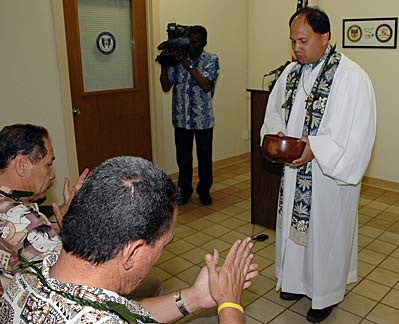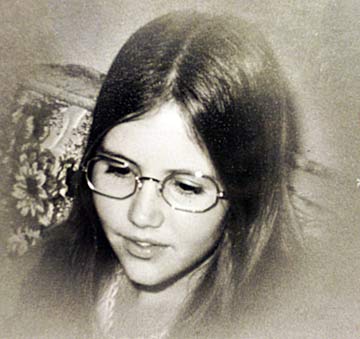
|
U.S. Navy agents
pursue cold cases
A new office will help further
a partnership with the state to
track unsolved crime leads
More than eight unresolved homicides, or cold cases, involving island military personnel are still being pursued by special agents of the Naval Criminal Investigative Service.
Last October, the NCIS teamed up with the state Attorney General's Office to formulate the "cold case squad" to consolidate their resources in trying to resolve more than 400 unsolved homicides since 1975.

![]()
Dawn "Dede" Bustamante: A probe into her killing in 1975 remains active with the state and Navy
David Brant, NCIS director, said his agency began this type of relationship with local and state governments in 1995.
Since then, this partnership has resulted in closing 46 cold cases, Brant said, and there are still more than 70 active investigations going on around the world.
"The strength of this partnership is not only in prosecuting those who have done wrong," Brant said, "but also bringing closure to families, victims and loved ones who in many cases have spent 10, 20 or 30 years in a state of uncertainty and unknown."
Brant said NCIS has 160 offices worldwide and at least 10 special agents who concentrate solely on cold cases.
"NCIS has a worldwide presence," Brant said, "and is able to reach out anywhere in the world to track down leads local agencies might not have the resources to do."
In Hawaii, Bradley Howell, special agent in charge of the Pacific area, said there are 45 agents assigned to Kaneohe, Pearl Harbor and Guam.
Bruce Warshawski, a local NCIS special agent, said one of Hawaii's cold cases involves the rape and killing of Dawn "Dede" Bustamante on March 14, 1975.
In September 2002, DNA testing excluded Delmer Edmonds Jr., a former Kaneohe Marine, as the source of seminal fluid taken from the 13-year-old homicide victim.
Prosecutors believed they had sufficient evidence beyond a reasonable doubt that Edmonds was responsible for the crimes he was charged with before the DNA results were known.
Edmonds allegedly told a cellmate that he remembered going to a party and then saw two girls walking, prosecutors said. He noted he was high on acid and did not know whether he killed the girl. He also said he left semen and that the DNA would match his semen. Edmonds denied making those statements.
Warshawski said the Bustamante case is still active and is being investigated by the Attorney General's Office.
Another cold case involves a Pearl Harbor sailor who allegedly was the victim of a contract killing in 1975, Warshawski said. The victim had been shot three times near Bloch Arena.
Warshawski said that resolution of cold cases often hinges on people who may change their testimony years later.
He said that was what happened in a case involving Ensign Andrew Muns, who was a disbursing agent on an oiler -- USS Cacapon -- in the Philippines in 1968.
"Initially, he was suspected of theft," Warshawski said, "and he disappeared and was declared a deserter.
"However, his family, especially a sister, never gave up."
Thirty years later, NCIS agents, in reviewing the file and re-interviewing people, came across a person who was bragging about the theft and under questioning admitted to the crime.
Muns' body had been hidden in the oiler's ventilation system and the vessel had been taken apart and sold for scrap metal, so his body was never found.
Advances in criminal investigative techniques also have helped resolve cold cases.
"It was DNA which reopened the case of a serial rapist who had been breaking into naval housing at Pearl Harbor," Warshawski said.
In 2000, a sailor was brought out of retirement, court-martialed and convicted based on techniques that were not available in 1992 when the rapes occurred.
Several years later, in another cold case, a sailor pled no contest to abusing and killing his daughter 15 years earlier. That case involved exhuming the child's body and interviews with various witnesses.
Several years later, in another cold case, a sailor pleaded no contest to abusing and killing his daughter 15 years earlier. That case involved exhuming the child's body and interviews with various witnesses.
[News] [Business] [Features] [Sports] [Editorial] [Do It Electric!]
[Classified Ads] [Search] [Subscribe] [Info] [Letter to Editor]
[Feedback]
